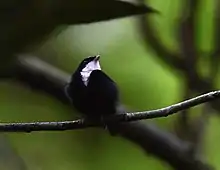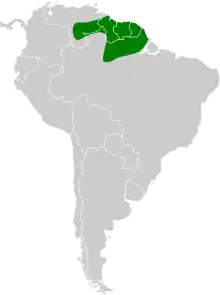White-throated manakin
The white-throated manakin (Corapipo gutturalis) is a species of bird in the family Pipridae. It is found in Brazil, French Guiana, Guyana, Suriname, and Venezuela. Its natural habitat is subtropical or tropical moist lowland forest.
| White-throated manakin | |
|---|---|
 | |
| Scientific classification | |
| Domain: | Eukaryota |
| Kingdom: | Animalia |
| Phylum: | Chordata |
| Clade: | Dinosauria |
| Class: | Aves |
| Order: | Passeriformes |
| Family: | Pipridae |
| Genus: | Corapipo |
| Species: | C. gutturalis |
| Binomial name | |
| Corapipo gutturalis (Linnaeus, 1766) | |
 | |
| Synonyms | |
|
Pipra gutturalis Linnaeus, 1766 | |
Taxonomy
_-_Corapipo_gutturalis_(cropped).png.webp)
In 1760 the French zoologist Mathurin Jacques Brisson included a description of the white-throated manakin in his Ornithologie. He used the French name Le manakin à gorge blanche and the Latin Manacus gutture albo.[2] Although Brisson coined Latin names, these do not conform to the binomial system and are not recognised by the International Commission on Zoological Nomenclature.[3] When in 1766 the Swedish naturalist Carl Linnaeus updated his Systema Naturae for the twelfth edition, he added 240 species that had been previously described by Brisson.[3] One of these was the white-throated manakin. Linnaeus included a brief description, coined the binomial name Pipra gutturalis and cited Brisson's work.[4] The specific name gutturalis is Medieval Latin for "of the thoat".[5] This species is now placed in the genus Corapipo that was introduced by the French naturalist Charles Lucien Bonaparte in 1854.[6] The white-throated manakin is monotypic.[7]
References
- BirdLife International (2018). "Corapipo gutturalis". IUCN Red List of Threatened Species. 2018: e.T22701093A130270372. doi:10.2305/IUCN.UK.2018-2.RLTS.T22701093A130270372.en. Retrieved 12 November 2021.
- Brisson, Mathurin Jacques (1760). Ornithologie, ou, Méthode contenant la division des oiseaux en ordres, sections, genres, especes & leurs variétés (in French and Latin). Vol. 4. Paris: Jean-Baptiste Bauche. pp. 444–446, Plate 36 fig 1. The two stars (**) at the start of the section indicates that Brisson based his description on the examination of a specimen.
- Allen, J.A. (1910). "Collation of Brisson's genera of birds with those of Linnaeus". Bulletin of the American Museum of Natural History. 28: 317–335. hdl:2246/678.
- Linnaeus, Carl (1766). Systema naturae : per regna tria natura, secundum classes, ordines, genera, species, cum characteribus, differentiis, synonymis, locis (in Latin). Vol. 1, Part 1 (12th ed.). Holmiae (Stockholm): Laurentii Salvii. p. 340.
- Jobling, J.A. (2018). del Hoyo, J.; Elliott, A.; Sargatal, J.; Christie, D.A.; de Juana, E. (eds.). "Key to Scientific Names in Ornithology". Handbook of the Birds of the World Alive. Lynx Edicions. Retrieved 27 June 2018.
- Bonaparte, Charles Lucien (1854). "Conspectus Volucrum Anisodactylorum". L'Ateneo Italiano. Raccolta di Documenti e Memorie Relative al Progresso delle Scienze Fisiche. 2 (11): 311–321 [316].
- Gill, Frank; Donsker, David, eds. (2018). "Old World sparrows, snowfinches, weavers". World Bird List Version 8.2. International Ornithologists' Union. Retrieved 29 June 2018.
